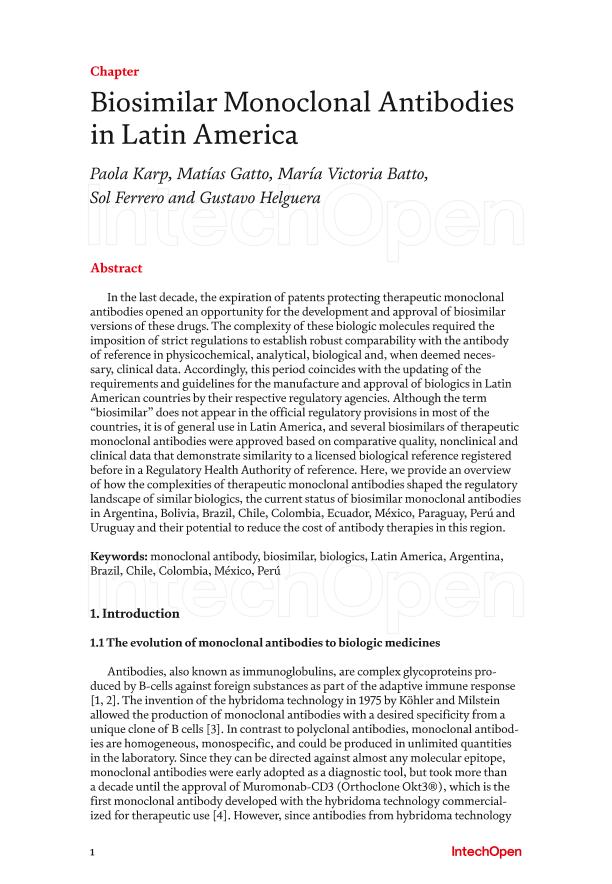Capítulo de Libro
Biosimilar monoclonal antibodies in Latin America
Título del libro: Biosimilars
Karp, Paola Julieta ; Gatto, Matías Iván
; Gatto, Matías Iván ; Batto, María Victoria; Ferrero, Sol
; Batto, María Victoria; Ferrero, Sol ; Helguera, Gustavo Fernando
; Helguera, Gustavo Fernando
 ; Gatto, Matías Iván
; Gatto, Matías Iván ; Batto, María Victoria; Ferrero, Sol
; Batto, María Victoria; Ferrero, Sol ; Helguera, Gustavo Fernando
; Helguera, Gustavo Fernando
Fecha de publicación:
2021
Editorial:
IntechOpen
ISBN:
978-1-83881-943-9
Idioma:
Inglés
Clasificación temática:
Resumen
Antibodies, also known as immunoglobulins, are complex glycoproteins produced by B-cells against foreign substances as part of the adaptive immune response [1, 2]. The invention of the hybridoma technology in 1975 by Köhler and Milstein allowed the production of monoclonal antibodies with a desired specificity from a unique clone of B cells [3]. In contrast to polyclonal antibodies, monoclonal antibodies are homogeneous, monospecific, and could be produced in unlimited quantities in the laboratory. Since they can be directed against almost any molecular epitope, monoclonal antibodies were early adopted as a diagnostic tool, but took more than a decade until the approval of Muromonab-CD3 (Orthoclone Okt3®), which is the first monoclonal antibody developed with the hybridoma technology commercialized for therapeutic use [4]. However, since antibodies from hybridoma technology have only murine sequences, in human patients they exhibited limited effector function [5], were immunogenic inducing anti-mouse antibodies, and had a significantly reduced half-life [6]. Therefore, it was not until the development of recombinant monoclonal antibodies in the 1980s and 1990s that a new era of biologic therapy began, with the chimerical [7], humanized [8] and fully human antibodies [9]. Each step involved the gradual replacement of murine segments of the antibody sequence by the corresponding human sequence: in chimeric antibodies the constant region was replaced, and in humanized antibodies, the framework flanking the complementarity-determining regions and the constant region were replaced, and in human monoclonal antibodies the whole sequence is human. Further engineering allowed their customization, creating variants in valence, size, effector functions and with the conjugation of compounds for delivery to targeted cell types such as cancer.
Archivos asociados
Licencia
Identificadores
Colecciones
Capítulos de libros(IBYME)
Capítulos de libros de INST.DE BIOLOGIA Y MEDICINA EXPERIMENTAL (I)
Capítulos de libros de INST.DE BIOLOGIA Y MEDICINA EXPERIMENTAL (I)
Citación
Karp, Paola Julieta; Gatto, Matías Iván; Batto, María Victoria; Ferrero, Sol; Helguera, Gustavo Fernando; Biosimilar monoclonal antibodies in Latin America; IntechOpen; 2021; 1-27
Compartir
Altmétricas



